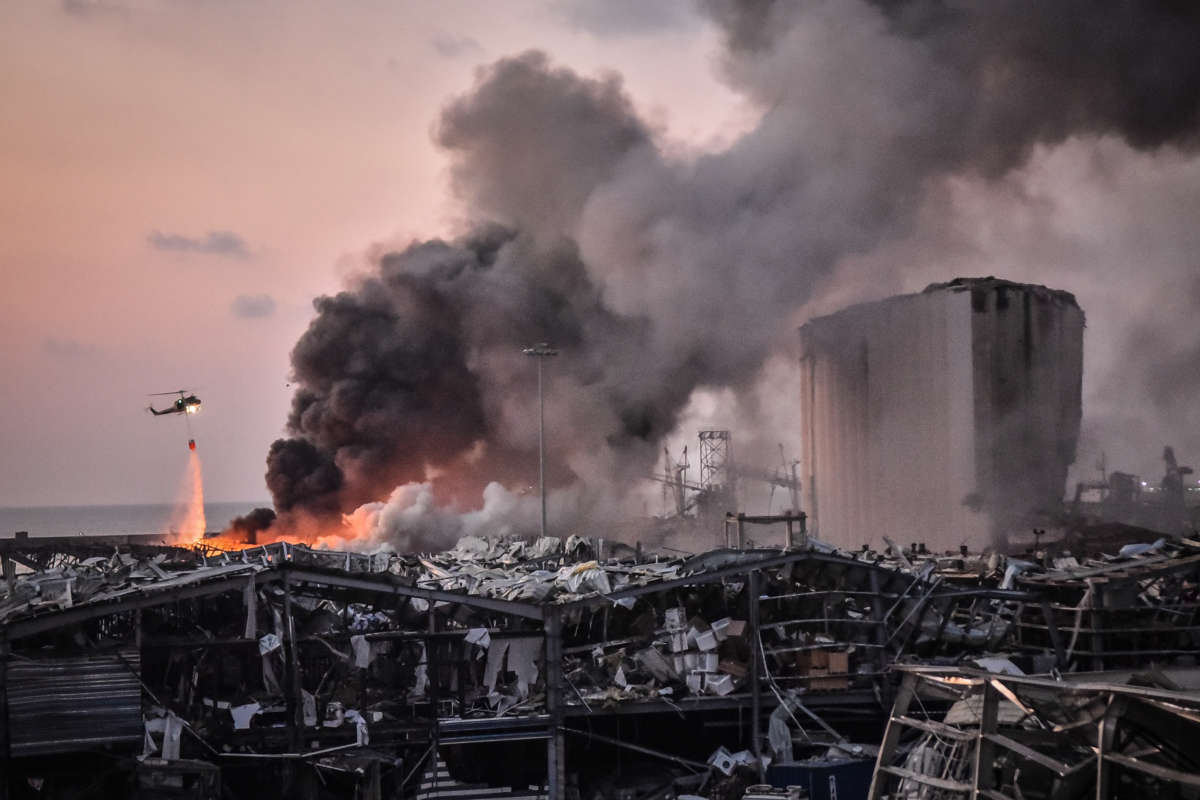Honest, paywall-free news is rare. Please support our boldly independent journalism with a donation of any size.
A powerful explosion that ripped through Beirut on Tuesday and killed more than 130 people may be the latest example of the danger posed by a common fertilizer stored in communities throughout the U.S.
As investigators work to find the official cause of the blast, Lebanon President Michel Aoun said it was fueled by an estimated 2,750 metric tons of ammonium nitrate that was stored unsafely in a warehouse.
Ammonium nitrate, used by farmers as fertilizer, has been a key component of catastrophic industrial accidents and terrorism, including the 2013 blast at an agricultural-products retailer that killed 15 and injured 260 people in Texas, and the 1995 bombing of the Alfred P. Murrah Federal Building in Oklahoma City that killed 168.
A 2020 Center for Public Integrity investigation found uneven oversight of the chemical in the United States, even after efforts to strengthen federal rules.
In Beirut this week, the explosion touched off a towering mushroom cloud and injured about 5,000. The death toll may rise: Emergency responders are still scouring the rubble for survivors.
“I lost my hearing for a few seconds, I knew something was wrong, and then suddenly the glass just shattered all over the car, the cars around us, the shops, the stores, the buildings. Just glass going down from all over the building,” eyewitness Hadi Nasrallah told the BBC.
The 2013 explosion in Texas forced U.S. authorities to re-examine federal rules meant to prevent such accidents. Then-President Barack Obama released an executive order that pushed officials to reduce the risks of hazardous chemicals, but agricultural businesses lobbied to block broad amendments to the U.S. Environmental Protection Agency’s risk management program.
When the EPA finally released its Chemical Disaster Rule, it didn’t add ammonium nitrate to the list of “highly hazardous” chemicals. Many safety advocates said the regulations were too soft on chemical manufacturers and users, but conceded the changes were at least a slight improvement from previous rules.
When President Donald Trump took office, his administration weakened the oversight with a “reconsideration rule” that removed third-party audits and safer-technologies assessments — a move the EPA said would save industry $88 million.
The estimated damage from the Texas explosion: $200 million.
The Trump administration has also tried to eliminate the agency that investigates industrial accidents like that one. Though President Donald Trump has not been able to persuade Congress to defund the Chemical Safety and Hazard Investigation Board, he’s kept it from releasing its reports by not filling the board’s four vacant seats, Public Integrity reported.
Federal laws say the public has a “right to know” if ammonium nitrate and other dangerous chemicals are stored in their community. But exercising that right is sometimes impossible, complicated by a wildly inconsistent patchwork of state laws.
The same information that’s publicly available in Nebraska is a state secret in Texas. In Iowa, the public can get a list of ammonium nitrate facilities on a government website. In Kentucky? Nothing.
In states withholding the information, the rationale is to keep terrorists from finding out where the operations are located. But that means firefighters and other members of the public are also in the dark.
Media that fights fascism
Truthout is funded almost entirely by readers — that’s why we can speak truth to power and cut against the mainstream narrative. But independent journalists at Truthout face mounting political repression under Trump.
We rely on your support to survive McCarthyist censorship. Please make a tax-deductible one-time or monthly donation.
